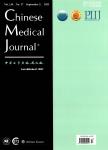Administration of imatinib in the first 90 days after allogeneic hematopoietic cell transplantation in patients with Philadelphia chromosome-positive acute lymphoblastic leukemia
Administration of imatinib in the first 90 days after allogeneic hematopoietic cell transplantation in patients with Philadelphia chromosome-positive acute lymphoblastic leukemia作者机构:Peking University Institute of Hematology Peking University People's Hospital Beijing 100044 China
出 版 物:《Chinese Medical Journal》 (中华医学杂志(英文版))
年 卷 期:2011年第124卷第2期
页 面:246-252页
核心收录:
学科分类:090603[农学-临床兽医学] 0710[理学-生物学] 07[理学] 071009[理学-细胞生物学] 09[农学] 0906[农学-兽医学] 0901[农学-作物学] 090102[农学-作物遗传育种]
基 金:National Outstanding Young Scientist's Foundation of China 国家教育部创新团队发展计划 Developing Funding of People's Hospital
主 题:Philadelphia chromosome acute lymphoblastic leukemia allogeneic hematopoietic cell transplantation minimal residual disease
摘 要:Background Relapse happens frequently after allogeneic hematopoietic cell transplantation (alIo-HCT) in the patients with Philadelphia chromosome-positive acute lymphoblastic leukemia (Ph^+ ALL). Detection of the minimal residual disease (MRD) before and after alIo-HCT is associated with higher relapse rate. Early administration of imatinib after alIo-HCT may prevent recurrent Ph^+ ALL. The aim of this study was to evaluate the safety and efficacy of imatinib in preventing hematological relapse when imatinib was administrated in the first 90 days after alIo-HCT. Methods Patients with Ph^+ ALL that underwent alIo-HCT were enrolled in a prospective study. A TaqMan-based real-time quantitative polymerase chain reaction (RQ-PCR) technique was used to detect the MRD (bcr-abl transcript levels). Imatinib therapy was initiated prior to 90 days after alIo-HCT if the patient's absolute neutrophil count (ANC) was above 1.0×10^9/L (without granulocyte colony-stimulating factor (G-CSF) administration) and the platelet count was greater than 50.0×10^9/L, or if the bcr-abl transcript levels were elevated in two consecutive tests, or if the bcr-abl transcript levels were 〉10.2 after the initial engraftment. The initial daily dose of imatinib was 400 mg/d for adults and 260 mg/m^2 for children (younger than 17 years). Imatinib was administered for at least I month and the bcr-abl TaqMan results were negative for 3 consecutive tests, or complete molecular remission (CR^mol) was sustained for at least 3 months. Results From May 2005 to October 2008, 29 patients were enrolled in this study, of whom, 19 patients were male and 10 were female. The median age of the enrolled patients was 33 years (range 6-50 years). Imatinib therapy was started at a median time of 60 days (range 20-122 days) post HCT (only one patient started Imatinib therapy at 122nd day after HCT). Twenty-five adult patients could tolerate a dose of 300-400 mg/d of imatinib, and three children tolerated a dose of 260 mg



